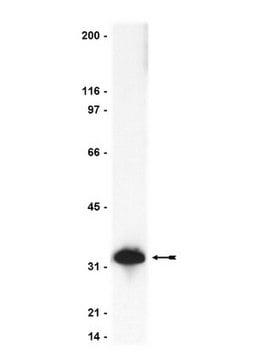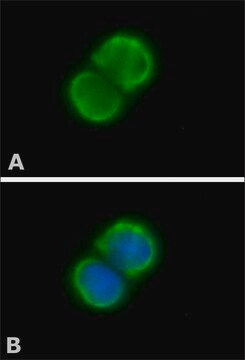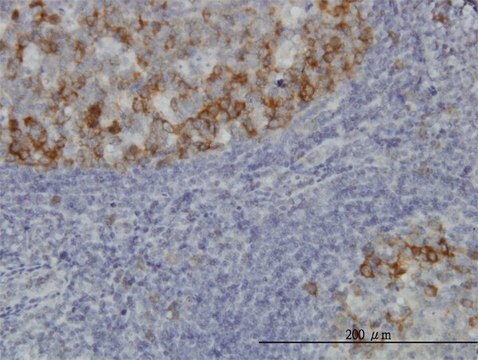MAB3610
Anti-Bub1 Antibody, clone 14H5
clone 14H5, Chemicon®, from mouse
About This Item
Productos recomendados
biological source
mouse
Quality Level
antibody form
purified immunoglobulin
antibody product type
primary antibodies
clone
14H5, monoclonal
species reactivity
primate, human
manufacturer/tradename
Chemicon®
technique(s)
immunocytochemistry: suitable
immunoprecipitation (IP): suitable
western blot: suitable
isotype
IgG1
NCBI accession no.
UniProt accession no.
shipped in
wet ice
target post-translational modification
unmodified
Gene Information
human ... BUB1(699)
Categorías relacionadas
General description
Specificity
Immunogen
Application
Epigenetics & Nuclear Function
Cell Cycle, DNA Replication & Repair
Immunocytochemistry: 1 μg/mL on tissue culture cells. Suggested fix is 3.5% PBS-buffered paraformaldehyde for 7 minutes. Permeabilization method is 0.2% Triton-X-100 after fixation. Suggested blocking buffer is 10 mM Tris, pH 7.5 with 150 mM NaCl with 0.1% BSA.
Immunoprecipitation: 1 μg/mL. Preferred cell lysis buffer is RIPA. Final reaction volume is 200 μL with a final protein concentration in the reaction mix of 1 mg/mL. Suggested capture agent is Protein G.
Optimal working dilutions must be determined by the end user.
Physical form
Storage and Stability
Other Notes
Legal Information
Disclaimer
¿No encuentra el producto adecuado?
Pruebe nuestro Herramienta de selección de productos.
Storage Class
10 - Combustible liquids
wgk_germany
WGK 2
flash_point_f
Not applicable
flash_point_c
Not applicable
Certificados de análisis (COA)
Busque Certificados de análisis (COA) introduciendo el número de lote del producto. Los números de lote se encuentran en la etiqueta del producto después de las palabras «Lot» o «Batch»
¿Ya tiene este producto?
Encuentre la documentación para los productos que ha comprado recientemente en la Biblioteca de documentos.
Nuestro equipo de científicos tiene experiencia en todas las áreas de investigación: Ciencias de la vida, Ciencia de los materiales, Síntesis química, Cromatografía, Analítica y muchas otras.
Póngase en contacto con el Servicio técnico







